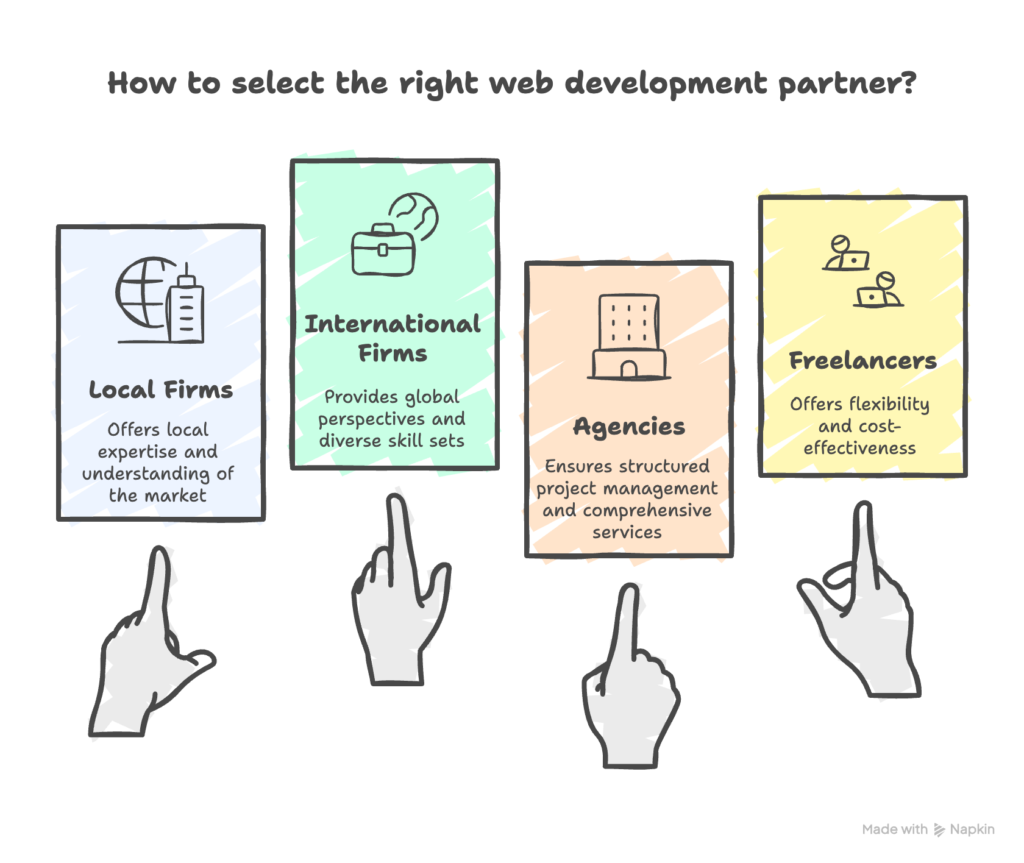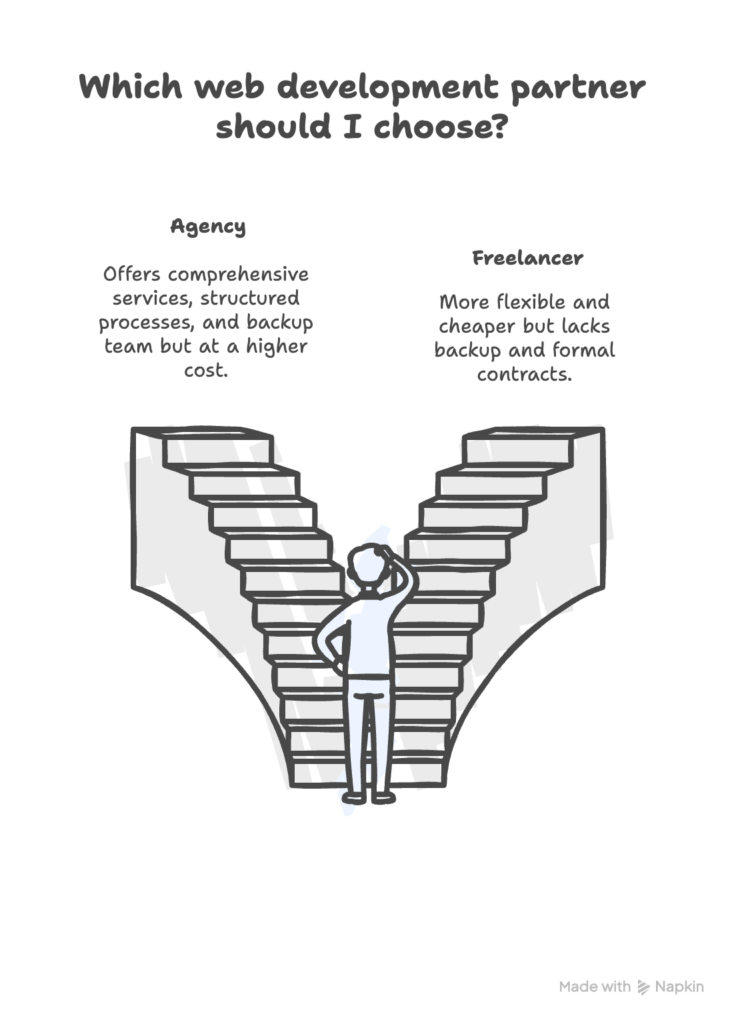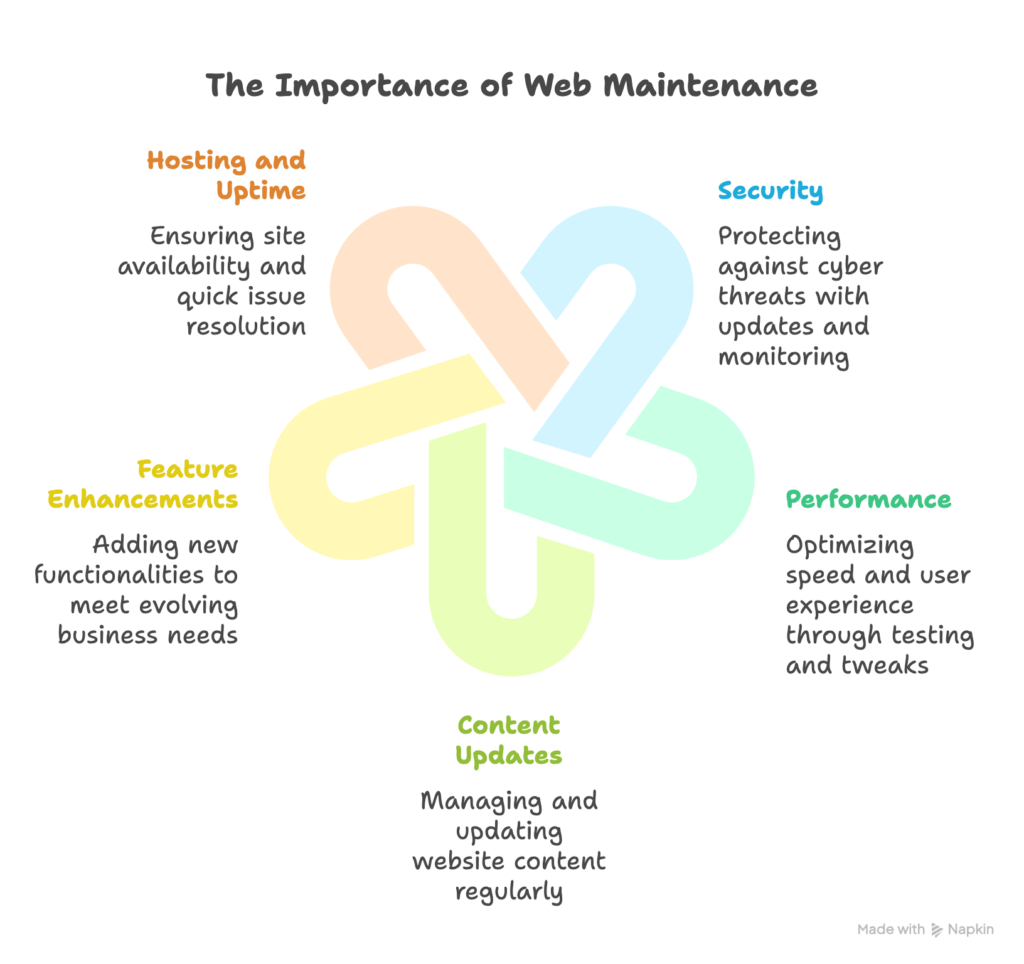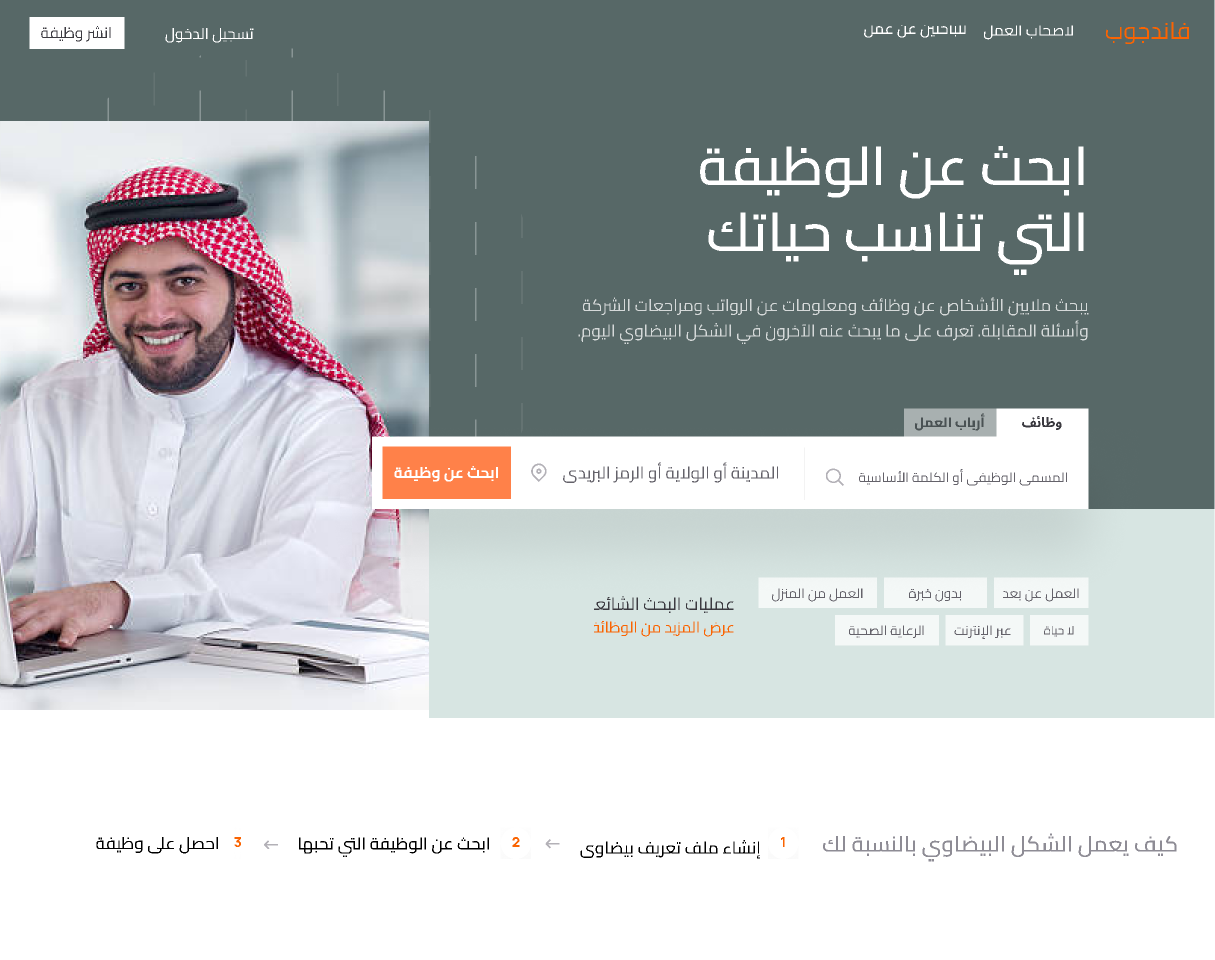Selecting the Right Web Development Partner in Bahrain & Saudi Arabia: What Entrepreneurs Need to Ask
Bahrain and Saudi Arabia’s tech sectors are booming. According to Startup Genome, Bahrain’s startup ecosystem generated $1.2B in value (2021–2023) with 40% annual growth[1]. Riyadh similarly has seen a surge – over $2.6B in VC funding flowed into startups since 2018, driven by Vision 2030 reforms[2]. In this fast-growing digital landscape, a strong online presence is non-negotiable for startups and SMEs. Choosing the right web development partner can make or break your project: the right team will deliver a site that drives customers and sales, while the wrong choice can waste time and money.
Bahrain has heavily invested in IT infrastructure and even became the MENA region’s first country with a “cloud-first” policy[3]. Local initiatives like Bahrain FinTech Bay and $100M startup funds are accelerating innovation[4]. In Saudi Arabia, the market is even larger – a $1.1T GDP and 36M+ population provide a huge opportunity[2]. Government programs (Vision 2030) and abundant funding are creating a founder-friendly ecosystem. All this means more demand for quality digital platforms. Entrepreneurs in both countries must vet potential developers rigorously, asking the right questions and avoiding common pitfalls, to ensure their website, app or e-commerce platform delivers results.

Below is a comprehensive guide – with local context and expert sources – to help entrepreneurs in Bahrain and Saudi Arabia select a web development partner wisely. We’ll compare local vs. international firms, agencies vs. freelancers, detail support and maintenance needs, list key questions to ask, highlight common mistakes to avoid, and even share a case example. Finally, we introduce EchoSphere Technologies, a local tech provider, as a partner ready to help.
Understand Your Project Needs Upfront
Before you start talking to developers, clarify your own goals and requirements. Define what you want to build, why, and by when. Are you launching an online store, a corporate site, a SaaS platform, or a mobile-friendly web app? Make a list of desired features (e.g. user logins, payment processing, content management, e-commerce, multi-language support). Estimate your budget and timeline as early as possible. As a guide recommends, “start by defining your project’s scope and expectations”[5].
Key steps here include:
- Define scope and goals: What is the primary purpose of your site? (lead generation, e-commerce sales, information, etc.). A brochure site has different needs than a complex marketplace. Ensure you know which category you fall into[6].
- Identify audience and branding: Who will use the site? What design/language do they expect? Make sure your partner will understand your brand and target audience. As Business.com advises, “If your developer doesn’t understand your business, visitors will arrive at a site that is inconsistent with your image, mission and goals.”[7]
- Set budget range: Be upfront about what you can afford. Ask developers what is included in their price (design, coding, hosting, maintenance, etc.)[8]. Beware of quotes that are unusually low – that can be a red flag.
- Determine timeline: When do you need launch? Communicate deadlines clearly. A good partner will ask about milestones and a realistic timeline before quoting.
- Gather examples: Show potential partners sites you like (and dislike). This helps align expectations on style and functionality.
By going into vendor discussions with a clear vision and requirements, you can avoid scope creep and miscommunication. As one hiring guide notes, rushing this step “can lead you to miss red flags” and result in a final site that doesn’t meet your needs[5]. Instead, write a simple project brief and be ready to explain it. Any competent agency or freelancer will ask detailed questions, such as which features are most critical or who your competitors are, to ensure they truly grasp your goals. If they don’t, that’s a warning sign.
Local vs. International Development Partners
A major decision is whether to hire a local firm (onshore) or look for international (nearshore/offshore) agencies. Each has pros and cons:
- Local (Onshore) agencies: Working with a Bahrain-based or Saudi-based developer offers cultural and geographic alignment. They understand local market nuances, regulations, and business culture. For example, Saudi web design firms know local payment gateways, Arabic/English language needs, and Vision 2030 priorities[9]. Communication is easier (same time zone, languages). References and reputation are accessible (you can visit their office, meet in person). However, local rates can be higher due to higher operating costs.
- Regional (Nearshore) partners: Countries like Egypt or Turkey can be a middle ground. Costs are lower than GCC but teams may still share some cultural similarities and some English proficiency. The time difference is moderate, which can work with flexible schedules.
- International (Offshore) teams: Firms in India, Eastern Europe, or elsewhere often offer very competitive pricing and a vast pool of technical talent. They excel at bringing niche technical expertise (AI, blockchain, etc.) as the Proven Consult guide notes[10]. But challenges include bigger time zones, potential language barriers, and possible lack of local-market understanding (for example, compliance with Saudi Arabia’s new Personal Data Protection Law (PDPL)). You will have to manage communication more deliberately (scheduled calls, clear processes).
An experienced guide to outsourcing in the Gulf recommends thinking about your priority: cost vs convenience vs expertise[11]. Bahrain and Saudi businesses often lean toward onshore/nearshore for mission-critical work, especially when local insight is important. The Medium article on Saudi web design even points out that local firms bring a “deep understanding of the local market, cultural nuances, and specific challenges”[9] – something that offshore partners may lack.
Questions to consider: Do you need someone to also understand local business practices? Are you comfortable with English-only teams, or do you require Arabic support? Does your project need compliance with local laws (which might favor a regional expert)? How important is real-time collaboration? If answers lean toward high-touch service, a local agency may be best. If budget is the bottleneck, a hybrid model could work: e.g. hire a local consultant/project manager who in turn works with an offshore dev team.
Agency vs. Freelancer: Pros and Cons
Another key choice is between hiring a web agency (or consultancy) versus an individual freelancer.
- Agency (Firm): Typically offers a team covering all aspects – design, frontend and backend development, QA, project management, etc. An agency can handle larger or more complex projects smoothly because it has multiple specialists. They often provide structured processes (sprints, testing, deployment) and can replace team members if someone is unavailable. Agencies usually offer formal contracts, SLAs and ongoing maintenance plans. In short, they are like a pit crew for your website. As one article notes, a “web development and maintenance agency… are the pit crew that keeps your site in top shape”[12]. The downside is cost: agencies’ overhead means higher fees.
- Freelancer (Individual): Might suit very small or one-off projects (e.g. a simple landing page or tweaks to an existing site). Freelancers can be cheaper and more flexible, but rely on one person’s availability. There’s risk if the freelancer falls sick or moves on – no backup team. With freelancers you’ll need to verify their skills and references very carefully, as there’s no company reputation behind them. Some entrepreneurs use a mix: a freelancer for initial build, then retainer with agency for maintenance, or vice versa.
In Bahrain and Saudi Arabia, there’s no shortage of both agencies and freelancers. Many local creative/design agencies also do web development. Because SMEs often need a bit of everything (design, dev, SEO, marketing), agencies can be more reliable. If you hire a freelancer, insist on examples of complete websites they built and clarify if they’ll handle post-launch issues or if you’ll need someone else for updates. Agencies typically bundle maintenance and support in their offering, which can avoid nasty surprises later.

Key Questions to Ask Your Web Development Partner
Once you’ve narrowed down candidates (agency or freelancer, local or offshore), vet them by asking smart questions. A recommended approach is to have a standard list of questions to compare all vendors. Important questions include:
- Experience and Portfolio: “Have you built projects like mine?” Review their portfolio closely. Ask to see live website examples (not just screenshots) to test usability, speed, and mobile responsiveness[13]. If a developer hesitates to share references or live links, be wary[14]. Check whether they have experience in your industry (e.g. fintech, e-commerce, healthcare) – industry-specific know-how can speed development and avoid compliance issues.
- Understanding of Your Business: Gauge how well they grasp your goals. Can they explain your needs back to you? Good developers will ask questions about your target audience, competition, and brand story[15]. As Business.com warns, a developer who doesn’t understand your business will likely deliver a site that “is inconsistent with your image, mission and goals.”[7]. So watch out if they seem confused about your objectives or audience.
- Process and Timeline: “What’s your typical development process?” Find out if they follow an iterative/agile approach (with milestones and regular reviews) or a waterfall model. Ask for a rough timeline: how long would a project of your scope take? Verify who will manage the project (project manager? who will you report to?).
- Team and Resources: If you hire an agency, ask who will be on your project team (designers, developers, QA, etc.), and whether the same people will stay on from start to finish. Turnover is common; ensure key roles won’t change frequently. If using a freelancer, ask if they subcontract any work, or how they handle unexpected tasks.
- Technology Stack: “What technologies and tools do you use?” Ensure they’re proficient in the languages and platforms your project needs (e.g. WordPress, Magento, Laravel, React, etc.). Also ask how they handle SEO, mobile optimization and security – features like responsive design and clean code are crucial.
- Maintenance and Support: Crucially, clarify what happens after launch[16][17]. Ask if they offer support packages or retainer services for updates, bug fixes, or feature enhancements. Will they handle hosting or just hand over files? It’s important to know how they’ll keep the site secure and up-to-date. A cautionary note: “Ignoring website maintenance is like skipping oil changes”[18]. You want your partner to ensure your site continues running smoothly, fixes issues, and gets updates (both content and technical).
- Communication: How will you communicate during the project? Do they schedule regular status meetings or use collaboration tools (Slack, Trello, etc.)[19]? Make sure you’re comfortable with their communication style and frequency. Clear communication is one of the biggest success factors.
- Budget Details: Confirm what is included in their quote. Does it cover design, development, content entry, licensing fees, hosting setup, and SEO? Are maintenance and warranty included, or extra? Ask about payment terms: is it fixed-price or hourly, and how are change requests handled? Transparent pricing and a written contract are must-haves to prevent disputes later[8].
By asking these questions, you not only gather facts but also gauge the partner’s responsiveness and professionalism. A good developer will answer clearly and proactively, while a dismissive or vague response is a red flag. Remember: “Don’t ignore your gut.” If something feels off during discussions, it often indicates potential problems down the line[20]. Always trust those instincts.
Support and Maintenance: Planning for Long-Term Success
A common oversight is failing to plan for post-launch maintenance. Almost every website or app requires ongoing updates and fixes. Think of a site like a live product: it needs security patches, content updates, performance tuning, and possibly new features as your business grows. As one tech blog puts it, web agencies are like a pit crew that “keeps your site in top shape”[12]. Here’s why support matters:
- Security: Web platforms face constant cyber threats. Unpatched software or plugins become “a hacker’s playground”[21]. A good partner will set up regular security updates, backups, and monitoring.
- Performance: Without optimization, sites can get slow as content grows, leading to poor user experience and SEO penalties[22]. Ongoing testing and speed tweaks (images, caching, code optimization) are important.
- Content updates: If you publish blog posts, add products, or change marketing copy, someone needs to manage that. Many businesses rely on their web partner to provide an admin interface or do the updates for them.
- Feature enhancements: As your business evolves, you may need new features (e.g. integrating a new payment method, improving the UI). Discuss upfront how future development will be handled.
- Hosting and Uptime: Will your partner host the site or simply hand it off? Ensure you know who will respond to outages and how quickly issues will be resolved.
When speaking to a vendor, ask specifically about maintenance plans. Do they offer monthly or annual support contracts? What’s included (hours per month, response time SLAs, etc.)? Transparent agencies will outline their maintenance packages. As one article recommends, choose an agency with “clear, upfront costs” for maintenance[23] rather than dealing with surprise charges later.
Skipping maintenance is risky. Statistics show 80% of cyber incidents are preventable with regular updates, and poorly maintained sites suffer lost traffic and revenue[18]. Therefore, factor in ongoing costs as part of your investment. Even a basic maintenance retainer (often a few hundred dollars per month) can save thousands in emergency fixes.

Trust and Verification: Vetting Your Partner
Selecting a partner is ultimately about trust. How can you build it before signing on the dotted line?
- Check Credentials: Verify that the agency or freelancer is legitimate. Do they have a business registration? How long have they been operating? An experienced firm will have a track record. Look up their founders and team on LinkedIn – credible profiles with a history in tech is a good sign.
- Assess Professionalism: Did they prepare a solid proposal? Are their communications prompt and professional? Do they have a structured process? A disorganized vendor can lead to a disorganized project.
- Ask for Client Testimonials: Many companies list client testimonials. Don’t just read them on the site – ask if you can contact a past client for a candid chat. If they wince at that request, it’s suspicious.
- Review Testimonials Carefully: If available, read the testimonials. For instance, EchoSphere’s site features client quotes praising their responsiveness and innovation. One CTO said EchoSphere’s team was “professional, responsive, and dedicated,” and considered them “an excellent choice”[25]. Such feedback can give confidence in a partner’s reputation.
- Start Small: If you’re unsure about a vendor, consider a trial project first. Give them a small piece of work (like a landing page or a design mockup) as a paid test. This reveals their style and reliability without risking the whole budget.
- Monitor Metrics: Once work starts, track progress against milestones. Use tools like Jira, Asana, or even spreadsheets to keep an eye on deliverables and deadlines. Accountability helps maintain trust on both sides.
By building trust through verification and clear processes, you set the stage for a smoother project. Remember, this is a partnership: both you and the developer should be invested in each other’s success.
Case Study: Lesson from “The Nourishers” (Bahrain)
Consider the example of The Nourishers, an online wellness platform in Bahrain. Founder Hamad Al Saad had built a following as a nutrition coach and wanted to create a marketplace connecting experts with customers. His idea was promising, but execution stalled. According to a case study, Al Saad “struggled to find an adequate web developer” for his two-sided marketplace[26]. He knew what he wanted – a sophisticated platform – but had not vetted partners thoroughly. This experience highlights several points:
- He underestimated how critical it was to choose the right developer. Without one, his project couldn’t launch, stalling his business growth.
- Al Saad had only one revenue stream (commissions), so delays were costly. This shows that unclear tech plans can threaten the viability of your business model.
- Facing investors on reality TV (Beban show), he had to decide whether to continue. This high-stakes pressure underscores why careful planning upfront is crucial.
While The Nourishers case doesn’t detail the ultimate outcome, it serves as a cautionary tale: a great idea alone isn’t enough. Had Al Saad defined his requirements clearly and asked targeted questions, he might have found a suitable developer sooner. It reminds us to learn from pitfalls: always verify that a partner can deliver the specific solution you need, especially for platforms where user experience and reliability are mission-critical.
This case underscores all the advice above: define scope, vet thoroughly, and ensure continued support. If The Nourishers had followed these steps, their journey might have been smoother.
Conclusion and Next Steps
In summary, startups and SMEs in Bahrain and Saudi Arabia must be strategic when selecting a web development partner. Here are the key takeaways:
- Start with clear goals: Define your project’s scope, features, budget and timeline before you approach anyone. This will guide your discussions.
- Decide local vs. offshore: Weigh cultural fit and convenience against cost. Local (Bahraini/Saudi) developers offer market insight and communication ease[9], while offshore partners may save budget but require more hands-on management.
- Agency vs freelancer: For comprehensive projects, agencies usually win on support and reliability. Freelancers can work for very small tasks, but be mindful of their limitations.
- Ask pointed questions: Vet the partner’s experience, processes, team, and post-launch support. Confirm they fully understand your business – a mismatch here can ruin the project[7].
- Plan for maintenance: Budget for ongoing support. A maintained site stays secure and relevant; neglect will cost you in security breaches or poor user experience[18].
- Watch for red flags: Unclear answers, no portfolio, or overly cheap quotes are warnings. Don’t ignore your gut feeling[20].
- Verify and trust, but verify: Check references, request trial work if needed, and keep communication formal.
As you evaluate partners, consider providers who embody the qualities above. For example, EchoSphere Technologies (a Bahrain-based firm) presents itself as “your trusted partner in driving technological excellence and innovation”[27]. Their clients praise them as “professional, responsive, and dedicated” – exactly the traits entrepreneurs should seek[25]. EchoSphere offers full-stack web and mobile development, plus support and maintenance, making them a one-stop choice in the region.
Ready to define success digitally? Discuss your needs with a proven partner. EchoSphere Technologies stands ready to help entrepreneurs in Bahrain and Saudi Arabia turn their ideas into powerful online platforms. Reach out to EchoSphere to start building your digital future today – because with the right partner, your business can thrive online.






